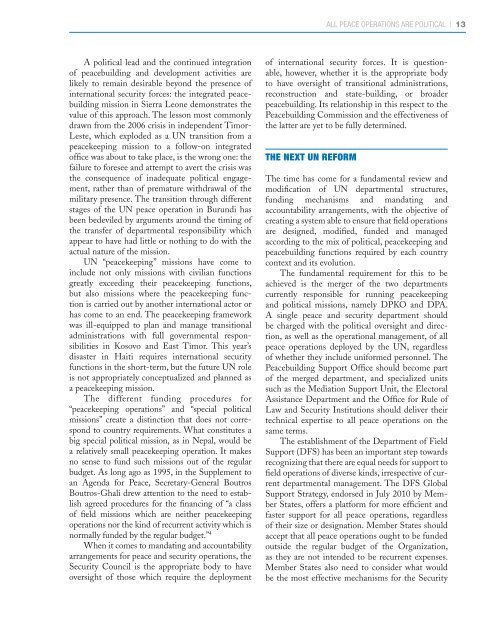here - Center on International Cooperation - New York University
here - Center on International Cooperation - New York University
here - Center on International Cooperation - New York University
Create successful ePaper yourself
Turn your PDF publications into a flip-book with our unique Google optimized e-Paper software.
All Peace Operati<strong>on</strong>s are Political | 13A political lead and the c<strong>on</strong>tinued integrati<strong>on</strong>of peacebuilding and development activities arelikely to remain desirable bey<strong>on</strong>d the presence ofinternati<strong>on</strong>al security forces: the integrated peacebuildingmissi<strong>on</strong> in Sierra Le<strong>on</strong>e dem<strong>on</strong>strates thevalue of this approach. The less<strong>on</strong> most comm<strong>on</strong>lydrawn from the 2006 crisis in independent Timor-Leste, which exploded as a UN transiti<strong>on</strong> from apeacekeeping missi<strong>on</strong> to a follow-<strong>on</strong> integratedoffice was about to take place, is the wr<strong>on</strong>g <strong>on</strong>e: thefailure to foresee and attempt to avert the crisis wasthe c<strong>on</strong>sequence of inadequate political engagement,rather than of premature withdrawal of themilitary presence. The transiti<strong>on</strong> through differentstages of the UN peace operati<strong>on</strong> in Burundi hasbeen bedeviled by arguments around the timing ofthe transfer of departmental resp<strong>on</strong>sibility whichappear to have had little or nothing to do with theactual nature of the missi<strong>on</strong>.UN “peacekeeping” missi<strong>on</strong>s have come toinclude not <strong>on</strong>ly missi<strong>on</strong>s with civilian functi<strong>on</strong>sgreatly exceeding their peacekeeping functi<strong>on</strong>s,but also missi<strong>on</strong>s w<str<strong>on</strong>g>here</str<strong>on</strong>g> the peacekeeping functi<strong>on</strong>is carried out by another internati<strong>on</strong>al actor orhas come to an end. The peacekeeping frameworkwas ill-equipped to plan and manage transiti<strong>on</strong>aladministrati<strong>on</strong>s with full governmental resp<strong>on</strong>sibilitiesin Kosovo and East Timor. This year’sdisaster in Haiti requires internati<strong>on</strong>al securityfuncti<strong>on</strong>s in the short-term, but the future UN roleis not appropriately c<strong>on</strong>ceptualized and planned asa peacekeeping missi<strong>on</strong>.The different funding procedures for“peacekeeping operati<strong>on</strong>s” and “special politicalmissi<strong>on</strong>s” create a distincti<strong>on</strong> that does not corresp<strong>on</strong>dto country requirements. What c<strong>on</strong>stitutes abig special political missi<strong>on</strong>, as in Nepal, would bea relatively small peacekeeping operati<strong>on</strong>. It makesno sense to fund such missi<strong>on</strong>s out of the regularbudget. As l<strong>on</strong>g ago as 1995, in the Supplement toan Agenda for Peace, Secretary-General BoutrosBoutros-Ghali drew attenti<strong>on</strong> to the need to establishagreed procedures for the financing of “a classof field missi<strong>on</strong>s which are neither peacekeepingoperati<strong>on</strong>s nor the kind of recurrent activity which isnormally funded by the regular budget.” 4When it comes to mandating and accountabilityarrangements for peace and security operati<strong>on</strong>s, theSecurity Council is the appropriate body to haveoversight of those which require the deploymentof internati<strong>on</strong>al security forces. It is questi<strong>on</strong>able,however, whether it is the appropriate bodyto have oversight of transiti<strong>on</strong>al administrati<strong>on</strong>s,rec<strong>on</strong>structi<strong>on</strong> and state-building, or broaderpeacebuilding. Its relati<strong>on</strong>ship in this respect to thePeacebuilding Commissi<strong>on</strong> and the effectiveness ofthe latter are yet to be fully determined.The Next UN ReformThe time has come for a fundamental review andmodificati<strong>on</strong> of UN departmental structures,funding mechanisms and mandating andaccountability arrangements, with the objective ofcreating a system able to ensure that field operati<strong>on</strong>sare designed, modified, funded and managedaccording to the mix of political, peacekeeping andpeacebuilding functi<strong>on</strong>s required by each countryc<strong>on</strong>text and its evoluti<strong>on</strong>.The fundamental requirement for this to beachieved is the merger of the two departmentscurrently resp<strong>on</strong>sible for running peacekeepingand political missi<strong>on</strong>s, namely DPKO and DPA.A single peace and security department shouldbe charged with the political oversight and directi<strong>on</strong>,as well as the operati<strong>on</strong>al management, of allpeace operati<strong>on</strong>s deployed by the UN, regardlessof whether they include uniformed pers<strong>on</strong>nel. ThePeacebuilding Support Office should become partof the merged department, and specialized unitssuch as the Mediati<strong>on</strong> Support Unit, the ElectoralAssistance Department and the Office for Rule ofLaw and Security Instituti<strong>on</strong>s should deliver theirtechnical expertise to all peace operati<strong>on</strong>s <strong>on</strong> thesame terms.The establishment of the Department of FieldSupport (DFS) has been an important step towardsrecognizing that t<str<strong>on</strong>g>here</str<strong>on</strong>g> are equal needs for support tofield operati<strong>on</strong>s of diverse kinds, irrespective of currentdepartmental management. The DFS GlobalSupport Strategy, endorsed in July 2010 by MemberStates, offers a platform for more efficient andfaster support for all peace operati<strong>on</strong>s, regardlessof their size or designati<strong>on</strong>. Member States shouldaccept that all peace operati<strong>on</strong>s ought to be fundedoutside the regular budget of the Organizati<strong>on</strong>,as they are not intended to be recurrent expenses.Member States also need to c<strong>on</strong>sider what wouldbe the most effective mechanisms for the Security
















